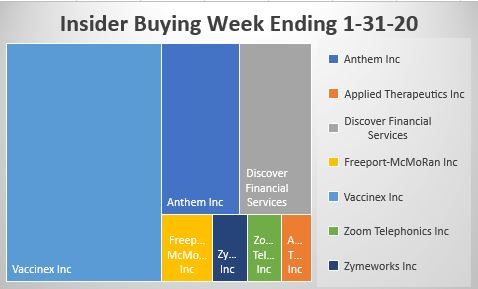
Talk about a quiet week for insider buying.
Earnings season is in full swing and many insiders are on the sidelines due to earnings blackout, but this is ridiculous. Add to it the coronavirus pandemic and no one is buying. It can only mean one thing- insiders don’t find this market cheap or compelling. There are always notable exceptions. Our stand out this week is the CEO Gail Boudreaux’s $2 million buy of Anthem, the health care insurer, at $263.70 per share. ANTM reported earnings on 1-29 and met expectations. ANTM price target was lowered to $355 from $380 by Credit Suise. Not sure what caused the pullback in the stock. It probably has more to do with Iowa than China, though. Bernie Sanders, rising in the polls, is a death knell for publicly traded health insurers should he win the 2020 Presidential election. Obviously Ms. Boudreaux doesn’t think that likely to happen. She was named CEO of Anthem in November of 2017 and was previously CEO of United Healthcare. This is our insider pick of the week.
Several insiders bought Discover Financial Services after DFS fell 9.5% after Q4 results and analyst downgrades. The largest being the CEO’s purchase of 15,000 shares at $73.74. Discover’s earnings shortfall was largely due to increases in loan delinquencies. It’s hard to get very excited about Discover with all that is happening in the rapidly moving fin tech sector. None the less history says it’s smart to follow insiders on this kind of pullback. We initiated a small position.
Large purchases of Vaccinex stock by Chairman Friedberg caused an immediate pop in the stock. Perhaps the name “Vaccinex” evoked some response to the coronavirus ripping the market as VCNX almost doubled in price from the $5 purchase price. It was a large purchase, $5 million amounting to 982,318 at $5.09 per share. It was joined by the CEO Zauderer purchase of 98,231 shares at $5.09 and a director’s purchase of 39,292 shares at $5.09. Let’s be clear, though, VCNX is not a coronavirus play. It is a legitimate development stage biotech working on Alzheimer, Huntington’s, and non small lung cancer treatments. The stock settled in at $6.95 on Friday’s close, up 40%. There is something troubling me about this purchase. For starters I don’t see the volume to support these trades on the dates they were filed. All of the purchases were done on 1-23-20 and there was only reported volume of around 5000 shares. Clearly then this was a private transaction. We would like to see more details of this and the filings don’t show it.
Insiders sell stock for many reasons, but they generally buy for just one – to make money. THE INSIDERS FUND invests in companies at or near prices that management has been willing to invest significant amounts of their own money in. After all, who knows a business better than the people running it? You’ve always heard the best information is inside information. This is as close to “insider information” that an ordinary investor is likely to see- and it’s entirely legal. Officers, directors, and 10% owners are required to inform the public through a Form 4 Filing any transaction, buy, sell, exercise, or any other with 48 hours of doing so. This info is available for free from the SEC’s Web site, Edgar, although we subscribe to the Washington Service as they provide a way to manage and make sense of the vast realms of data.
As a rule, we only look at material amounts of money, $200 thousand or more, as anything less could just be window dressing. The bar is different from selling because the natural state of management is to be sellers. This is because most companies provide significant amounts of management compensation packages as stock. Therefore, with selling, we analyze for unusual patterns, such as insiders selling 25 percent or more of their holdings or multiple insiders selling near 52-week lows. Another red flag is large planned sale programs that start without warning. Unfortunately, the public information disclosure requirements about these programs referred to as Rule 10b5-1 is horrendously poor. I also generally ignore 10 percent shareholders as they tend to be OPM (other people’s money) and perhaps not the smart money we are trying to read the tea leaves on.
Of course insiders can also be wrong about their Company’s prospects. They can easily be wrong about how much others will value them, and in many cases, maybe most cases have no more idea what the future may hold than you or I. In short, you can lose money following them. We have and we curse aloud, what were they thinking! Needless to say, past good fortune is no guarantee of future success. We may own positions, long or short, in any of these names and are under no obligation to disclose that. We welcome your comments on our analysis.
This blog is solely for educational purposes and the author’s own amusement. Investing with The Insiders Fund is for qualified investors and by Prospectus only. Nothing herein should be construed otherwise. To learn more about our strategy, visit our website. If you would like to hear more about how you can get involved with the Insiders Fund, please schedule some time on my calendar.
Prosperous Trading,
Harvey Sax

[…] it for this week. Hope you caught the ride on Anthem. It was our pick of the week last week and we rode it for a quick pop and have just a tail now. Gee, Barron’s just wrote it […]